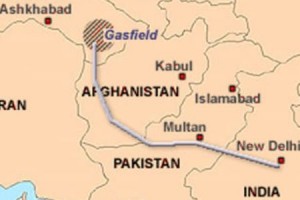TAPI – Gas pipeline Deal
Tuesday, November 22nd, 2011 4:36:17 by Momina Khan
TAPI – Gas pipeline Deal
On paper, it’s one of the sweetest gas deals there is. At one end, the world’s second largest gas field; at the other, 1.2 billion people demanding clean energy, and in the middle, countries in desperate need of revenues and jobs.
In reality and especially when that reality passes through Afghanistan and Pakistan en route to India things are a lot tougher.
Only last week, Pakistan’s Petroleum Ministry said it had agreed purchase terms with putative gas supplier Turkmenistan, and would sign a contract in mid-November. An official in the ministry said Turkmenistan would supply 1.3
billion cubic feet of gas per day for 25 years – For a pipeline that doesn’t exist outside of the imagination, it was a bold step.
The idea of a 1,700-km pipeline from Turkmenistan to India, known as TAPI, isn’t new. In the mid-1990s, Afghanistan’s then-rulers, the Taliban, talked to an American energy firm about building it.
Almost 15 years and no gas later, the Taliban have been kicked out of power, thousands have been killed in Afghanistan during the US-led war, and the Afghanistan-Pakistan border is one of the most dangerous areas in the world —
but the pipeline dream won’t die.
Debidatta Aurobinda Mahapatra, a researcher with the Centre for Central Eurasian Studies at the University of Mumbai said, “Without peace and stability in Afghanistan, the pipeline may become only a pipedream”.
According to the United Nations, Violence is at its worst since 2001, foreign forces have already started a security handover in parts of the country, ahead of a full withdrawal of combat troops by the end of 2014. Some fear that
when they go, full-scale civil war could break out.
Thomas Ruttig, a co-director with Afghanistan Analysts Network in Kabul said, “People are talking about pipelines, roads and railways, and these are all very vulnerable”.
The Afghan officials have pledged security forces, and talk about burying part of the pipeline underground, but even then it would still snake through the Taliban heartlands of Helmand and Kandahar in the south of Afghanistan.
“The pipeline is very long and very difficult to defend — you can’t put a soldier every 20 metres,” Ruttig said.
The Asian Development Bank earlier this year approved around half a million dollars to pay for consultancy and meetings on the project, but when asked at the end of October, it was no longer talking about TAPI.
According to the Afghan Ministry of Mines, the pipeline would pump 33 billion cubic metres a year from the South Lolotan field in Turkmenistan to Fazilka in India, crossing 735 kilometres of Afghan territory, then 800 kilometres
in Pakistan.
Between problematic and impossible, getting Pakistan and India to agree on anything is tough.
Relations between the nuclear-armed neighbours, who have fought three wars against each other since their independence from Britain in 1947, are prickly enough to scuttle the project without any help from the Taliban.
Two of the major stakeholders in TAPI, India and Pakistan, have major differences including security and transit fee, and more importantly, trust but for Afghans, who continue to endure high energy bills and frequent power cuts
even in big cities, the potential benefits are so great that the possibility of the pipeline is worth clinging onto.
“Everyone is waiting for the pipeline project because they believe it will be the cheapest energy they will have to run their business,” said Ahmad Khalid Yarmand, head of the Afghan business association in western city of Herat,
through which the pipeline would pass.
For the other countries in the plan, it could also be a winning deal. India and Pakistan would diversify their gas supply, while Turkmenistan, a former Soviet republic, wants to triple annual gas exports to 180 bcm by 2030, looking
beyond its traditional partner Russia to wider export markets.
In summary: it’s all very difficult and energy experts aren’t holding their breath.
Tags: Afghanistan, Ahmad Khalid Yarmand, America, Central Eurasian Studies, Debidatta Aurobinda Mahapatra, Fazilka, India, South Lolotan, TAPI, Thomas Ruttig, Turkmenistan, United Nations, University of Mumbai
Short URL: https://www.newspakistan.pk/?p=4318

















